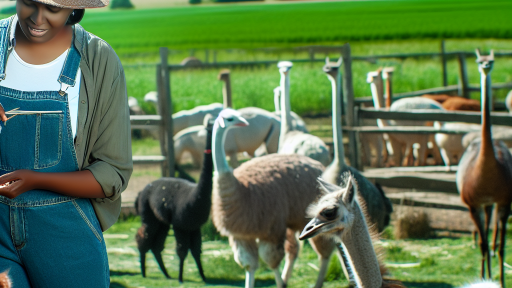Introduction to Livestock Waste Management and Its Importance
Livestock waste management plays a crucial role in agriculture.
Effective management of livestock waste is vital for environmental health.
It helps prevent contamination of water sources and reduces greenhouse gas emissions.
Additionally, proper waste management enhances soil fertility and crop productivity.
Environmental Benefits
Managing livestock waste significantly minimizes environmental pollution.
It reduces the risk of harmful runoff entering nearby water bodies.
This, in turn, protects aquatic ecosystems and public health.
Furthermore, proper management can lower methane emissions from decomposition processes.
Economic Advantages
Proper livestock waste management can lead to significant cost savings.
It decreases the need for chemical fertilizers by recycling nutrients back into the soil.
Moreover, it can enhance overall farm productivity and profitability.
Farmers can often sell excess compost created from managed waste.
Public Health Considerations
Effective waste management reduces the likelihood of disease outbreaks.
This is especially critical in areas where livestock are concentrated.
It ensures that pathogens do not spread to humans through water or food sources.
Transform Your Agribusiness
Unlock your farm's potential with expert advice tailored to your needs. Get actionable steps that drive real results.
Get StartedFarmers and workers benefit from reduced health risks as well.
Regulatory Compliance
Adhering to waste management practices helps farmers comply with regulations.
Many countries have strict laws regarding waste disposal from livestock operations.
These regulations are designed to protect the environment and public health.
Effective management ensures that farms meet these legal requirements.
Environmental Benefits of Proper Livestock Waste Management
Improved Soil Quality
Proper livestock waste management enhances soil fertility.
This practice increases organic matter in the soil.
Consequently, it improves soil structure and aeration.
Moreover, healthier soils support more robust plant growth.
Water Quality Protection
Effective waste management minimizes water contamination.
This process prevents runoff of harmful pathogens and nutrients.
Clean water is essential for both livestock and human health.
Additionally, it protects aquatic ecosystems from degradation.
Reduction of Greenhouse Gas Emissions
Proper handling of livestock waste reduces methane emissions.
Methane is a potent greenhouse gas contributing to climate change.
Adopting best practices in waste management helps mitigate this issue.
Consequently, it supports global efforts toward sustainability.
Promotion of Biodiversity
Effective waste management contributes to biodiversity preservation.
It fosters a healthier habitat for various species.
Healthy ecosystems rely on balanced nutrient cycles.
In turn, this promotes resilience against environmental disturbances.
Support for Regulatory Compliance
Proper waste management helps farmers comply with environmental regulations.
This compliance decreases the risk of fines and legal issues.
Additionally, it enhances the farm’s reputation in the community.
Showcase Your Farming Business
Publish your professional farming services profile on our blog for a one-time fee of $200 and reach a dedicated audience of farmers and agribusiness owners.
Publish Your ProfileFarmers can benefit from public perception and consumer trust.
Economic Advantages for Farmers through Efficient Waste Practices
Cost Savings on Fertilizers
Proper livestock waste management reduces the need for chemical fertilizers.
Farmers can utilize organic waste as a rich fertilizer alternative.
This practice significantly lowers input costs for crops.
Consequently, it enhances soil structure and fertility.
Increased Crop Yields
Effective waste management leads to healthier soils.
Healthy soils produce larger and more resilient crops.
Farmers can expect increased yields as a direct result.
Higher yields mean more income and improved market competitiveness.
Enhanced Livestock Health
Proper management reduces the risk of diseases among animals.
Healthier animals contribute to better overall farm productivity.
This can result in fewer veterinary costs over time.
Moreover, well-managed livestock can yield higher quality products.
Compliance with Regulations
Efficient waste practices help farmers meet environmental regulations.
Compliance can prevent costly fines and legal issues.
Additionally, it fosters positive relationships with local communities.
This commitment to responsible practices strengthens brand reputation.
Potential for Additional Revenue Streams
Farmers can explore composting strategies for waste processing.
Selling compost can generate additional income.
Additionally, some farmers convert waste into energy.
These innovative approaches diversify income sources effectively.
Gain More Insights: Emergency Procedures in Livestock Transportation
Health Implications of Neglecting Livestock Waste Management
Neglecting livestock waste management poses severe health risks.
Accumulating waste harbors pathogens that can affect animals and humans.
Moreover, improper waste disposal can contaminate water sources.
Spread of Zoonotic Diseases
Improper waste management increases the risk of zoonotic diseases.
These are diseases transmitted between animals and humans.
For instance, bacteria like Salmonella can spread through contaminated waste.
This situation can lead to severe illness in both humans and livestock.
Air Quality Concerns
Poorly managed livestock waste negatively impacts air quality.
Odorous compounds release harmful gases such as ammonia.
These gases can aggravate respiratory problems in nearby residents.
Additionally, airborne pathogens can spread diseases effectively.
Water Quality Degradation
Contaminated runoff from livestock waste can degrade water quality.
Nutrients from waste can cause algal blooms in water bodies.
These blooms reduce oxygen levels, harming aquatic life.
Furthermore, polluted water can carry harmful pathogens to drinking supplies.
Soil Health Issues
Neglecting waste management can lead to soil health problems.
Excessive nutrients from waste can alter soil chemistry.
This alteration can disrupt plant growth and agricultural productivity.
Showcase Your Farming Business
Publish your professional farming services profile on our blog for a one-time fee of $200 and reach a dedicated audience of farmers and agribusiness owners.
Publish Your ProfileUltimately, this issue affects local food systems and economies.
Impact on Livestock Health
Improper waste management directly jeopardizes livestock health.
Animals exposed to contaminated environments can contract diseases.
This exposure leads to higher veterinary costs for farmers.
Subsequently, these costs can threaten the sustainability of operations.
Ensuring Proper Waste Management Practices
Proper management of livestock waste is crucial for preventing health issues.
It protects animal, human, and environmental health.
Thus, implementing efficient waste management strategies is vital.
Learn More: Composting Livestock Waste A Farming Guide
Innovative Techniques in Livestock Waste Management
Precision Agriculture
Precision agriculture enhances livestock waste management through data-driven decisions.
This approach utilizes sensors to monitor waste levels in real-time.
Farmers can optimize the collection and storage of waste effectively.
As a result, they can minimize environmental impact significantly.
Biogas Production
Biogas production converts livestock waste into renewable energy.
This technique reduces greenhouse gas emissions effectively.
Farmers can utilize biogas for heating or electricity generation.
Consequently, they decrease reliance on fossil fuels.
Composting Practices
Composting transforms livestock waste into nutrient-rich fertilizers.
This method enhances soil structure and fertility.
Moreover, composting reduces the need for chemical fertilizers.
With proper techniques, livestock waste becomes a valuable resource.
Integrated Waste Management Systems
Integrated waste management systems streamline waste handling processes.
These systems combine various treatment methods for efficiency.
Farmers can select the most appropriate techniques based on specific needs.
This results in reduced waste volume and better resource recovery.
Education and Training
Education plays a critical role in implementing innovative techniques.
Farmers must stay informed about the latest technology and practices.
Workshops and training programs enhance knowledge and skills.
Consequently, this leads to improved waste management outcomes.
Explore Further: Safety Standards For Livestock Facilities

Regulatory Standards and Compliance for Waste Management Practices
Importance of Regulatory Frameworks
Regulatory frameworks play a crucial role in waste management.
They ensure that livestock operations follow necessary environmental standards.
Compliance helps protect public health and ecosystems.
Key Regulations Affecting Livestock Waste Management
Several regulations govern livestock waste disposal methods.
The Clean Water Act sets standards for water quality.
This act regulates runoff and effluent discharges from farms.
Additionally, the Resource Conservation and Recovery Act addresses waste management practices.
Farmers must follow guidelines for safe waste treatment and disposal.
Federal and State Responsibilities
Both federal and state authorities enforce waste management regulations.
The Environmental Protection Agency oversees federal regulations.
Showcase Your Farming Business
Publish your professional farming services profile on our blog for a one-time fee of $200 and reach a dedicated audience of farmers and agribusiness owners.
Publish Your ProfileState agencies implement and monitor local compliance.
Farmers are responsible for understanding both sets of rules.
Best Practices for Compliance
Implementing best practices ensures compliance with regulations.
Regular training sessions for farm staff enhance understanding.
Record-keeping is vital for documenting waste management efforts.
Conducting periodic audits can identify areas for improvement.
Benefits of Compliance
Compliance with waste management regulations offers numerous benefits.
It minimizes environmental impacts and improves community relations.
Moreover, it prevents costly fines and legal actions.
Ultimately, responsible practices enhance the farm’s reputation.
Learn More: Temperature Control In Livestock Facilities
Impact on Soil Health and Crop Productivity from Proper Waste Management
Enhancing Soil Nutrient Content
Proper livestock waste management enriches soil with essential nutrients.
Manure serves as a natural fertilizer for crops.
This increases nitrogen, phosphorus, and potassium levels in the soil.
Consequently, farmers witness improved crop yields and quality.
Promoting Microbial Activity
Healthy soil maintains diverse microbial communities.
Properly managed waste supports beneficial microorganisms.
These microorganisms enhance nutrient cycling in the soil.
In turn, this boosts plant health and productivity.
Improving Soil Structure
Good waste management practices enhance soil structure.
Soil aggregates form, improving aeration and water retention.
Additionally, better drainage reduces the risk of flooding.
A well-structured soil fosters robust root systems.
Minimizing Soil Erosion
Livestock waste can help prevent soil erosion.
Cover crops planted alongside livestock waste reduce runoff.
This protects valuable topsoil from being washed away.
Such practices promote sustainable agricultural landscapes.
Enhancing Crop Diversity
Incorporating livestock waste encourages crop diversification.
Diverse crops improve resilience against pests and diseases.
This practice supports a healthier farming ecosystem.
Farmers can achieve more sustainable production practices.
Case Studies: Successful Waste Management Practices in Agriculture
Innovative Solutions at Green Pastures Farm
Green Pastures Farm implemented a comprehensive waste management system.
They adopted anaerobic digestion technology for manure management.
This method converts waste into biogas for energy production.
As a result, they significantly reduced greenhouse gas emissions.
Additionally, the farm benefited from organic fertilizer creation.
This practice improved their soil quality and crop yields.
Community Efforts in Sustainable Waste Management
The Coastal Agriculture Cooperative started a community-driven initiative.
Farmers collaborated to manage livestock waste effectively.
They established a composting program to recycle organic materials.
Showcase Your Farming Business
Publish your professional farming services profile on our blog for a one-time fee of $200 and reach a dedicated audience of farmers and agribusiness owners.
Publish Your ProfileThis program provided valuable resources for local gardens.
Moreover, it enhanced soil fertility in surrounding farmlands.
Community engagement boosted awareness of sustainable practices.
Research-Driven Practices at River Valley Research Station
River Valley Research Station conducted experiments on waste management techniques.
They explored different methods for nutrient recovery from waste.
One successful practice involved using biofilters to treat wastewater.
This approach not only minimized pollution but also recovered nutrients.
Furthermore, their findings influenced local agricultural policies.
The research station shared best practices with regional farmers.
Integrating Technology in Waste Management
AgriTech Innovations launched a mobile app for farmers.
This app helps track livestock waste and monitor nutrient levels.
Farmers can optimize their waste management strategies using data.
The integration of technology streamlines waste processing.
As a result, it helps reduce costs and environmental impact.
Many farmers reported improved efficiency and productivity.




